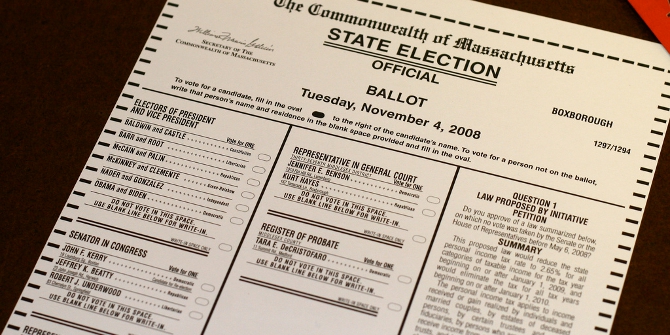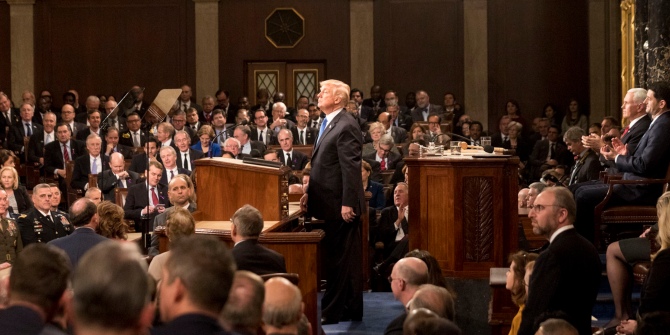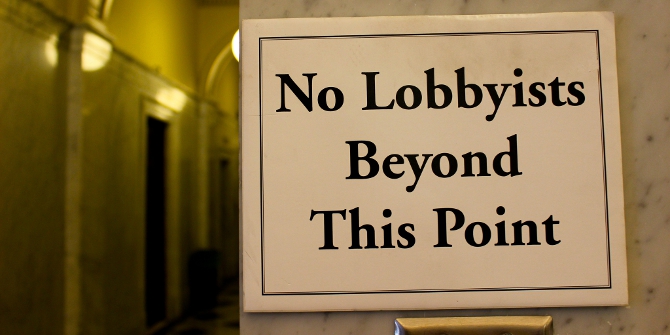 Despite the 2020 presidential election being called for now President-elect Joe Biden on Saturday, President Trump has refused to concede, and many in his administration are actively working to obstruct the transition to the Biden administration. Julie Norman writes that the actions of Trump and his enablers may have real consequences for the security of the country, and risk causing long lasting damage to many Americans’ trust in the electoral system.
Despite the 2020 presidential election being called for now President-elect Joe Biden on Saturday, President Trump has refused to concede, and many in his administration are actively working to obstruct the transition to the Biden administration. Julie Norman writes that the actions of Trump and his enablers may have real consequences for the security of the country, and risk causing long lasting damage to many Americans’ trust in the electoral system.
Trump’s refusal to concede the 2020 presidential election shouldn’t come as a surprise, and President-Elect Biden’s team is right to project calm, de-escalate the tension, and push forward with transition plans. While Trump is within his rights to request recounts in states within certain thresholds, these are not expected to change any outcomes, and all claims of widespread voter fraud remain unsubstantiated with multiple lawsuits already thrown out. But even if it’s acknowledged by many across the political spectrum that the outcome of the election won’t change, his intransigence does raise significant concerns for American democracy and security.
It is tempting to see Trump’s tweets and comments as pure noise and bluster. As one Trump senior aide commented, there is seemingly little harm in humouring Trump for this period before the electoral votes are counted by Congress on 14 December. But Trump’s rhetoric is already reverberating, with claims of election stealing echoed or entertained by William Barr in the Department of Justice, Mike Pompeo in the Department of State, and Lindsey Graham (R-SC) in the Senate, giving traction to Trump’s allegations rather than constraining them.
This has real consequences beyond election outcomes. In terms of security, transition times are always when states are most vulnerable to both internal and external threats, even more so if the transition is perceived as unstable or chaotic. This image has only been further stoked with Trump’s firing of Secretary of Defense Mark Esper this week. Further, giving a new administration access to agencies and resources is crucial for ensuring preparedness for various threats, especially in times of crisis as we are facing now. Indeed, the 9/11 Commission Report indicated that the transition delay for the George W Bush administration in 2000 may have contributed to shortcomings in preparedness for the September 11 attacks the following year. While we don’t expect another attack of that magnitude, the General Services Administration’s blocking of transition efforts, especially sharing intelligence briefings, could increase both short term and long term vulnerabilities.
In terms of democracy, Trump’s posturing, though perhaps seen as toothless by many inside the Beltway, is widely embraced by many in his base, risking long lasting damage to many citizens’ trust in the electoral system. One promising element of this unconventional election was the indication that the majority of Americans still believed in the robustness of US elections; casting doubt on their legitimacy for a large swath of voters could be irreparable.
Further, Trump’s obstinacy is, perhaps intentionally, spoiling any chance that a Biden administration might have in starting to bridge polarisation in the country. We know that the polarisation evident under Trump was increasing before his election, and it would be naïve to expect it to disappear after his term in office. But the level of polarisation under Trump, and the shift from mere divergence on issues to polarisation characterised by actual aversion and moral othering, are phenomena that threaten both the political and social fabric of America. Many Americans, Democrat and Republican, voted for Biden because of his emphasis on moderation, civility, and healing. Trump’s intransigence will only frustrate this already ambitious agenda.
Please read our comments policy before commenting.
Note: This article gives the views of the author, and not the position of USAPP– American Politics and Policy, nor of the London School of Economics.
Shortened URL for this post: https://bit.ly/3prspjy
About the author
 Julie Norman – UCL
Julie Norman – UCL
Dr Julie Norman (@DrJulieNorman2) is a Lecturer in the Department of Political Science at University College London (UCL), and a researcher at UCL’s Centre for US Politics (@CUSP_ucl).







Respectfully, I think Dr Norman isn’t looking much below the waterline.
This is a counter-strike in response to the Russia allegations of 2016/2017. Even after being debunked, many people still associate the words “Russia collusion” with “Trump.” That was a nuke launched into the GOP camp. To summon the spirit of Kenneth Waltz, an attack not met with retaliation is an act of surrender. That’s what’s occurring, retaliation.
No one actually thinks Trump truly believes he won.
This is a well-oiled operation to reestablish strategic parity between the two institutional parties. A Morning Consult poll shows 44% of independent voters either don’t think the election was “Free and Fair” or are “Unsure” if it was. That’s after just one week. A campaign with that type of efficacy isn’t invented on a whim, it’s the result of many months of planning. This is the start of a years-long publicity campaign designed to obstruct and subvert Biden.
The objective is to cripple and delegitimize Biden from day one, not to hold onto the presidency. When Biden is inaugurated he will immediately have the second lowest approval rate of an incoming president in history (after Trump). And, in two years, when the 2022 midterms roll around, no one will remember if the allegations were true or false, they’ll just remember the words “Election Fraud” and “Biden.” That’s the point. That’s the plan. And it’s working.